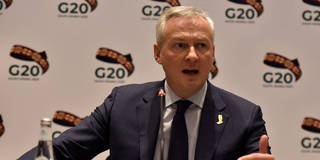Short of a vaccine, international cooperation is our best weapon against a deadly virus like COVID-19 – and our best defense against global economic collapse. As in the wake of the 2008 global financial crisis, the G20 should take the lead.
NEW YORK – Within just a few months, the COVID-19 coronavirus has enveloped the world, infecting 435,000 people, killing more than 19,000, and overwhelming even advanced economies’ health systems. Once the shock hits vulnerable low-income countries, the already-high human and economic costs will rise further – for the entire world. The only chance we have of limiting the fallout is to work together.

NEW YORK – Within just a few months, the COVID-19 coronavirus has enveloped the world, infecting 435,000 people, killing more than 19,000, and overwhelming even advanced economies’ health systems. Once the shock hits vulnerable low-income countries, the already-high human and economic costs will rise further – for the entire world. The only chance we have of limiting the fallout is to work together.